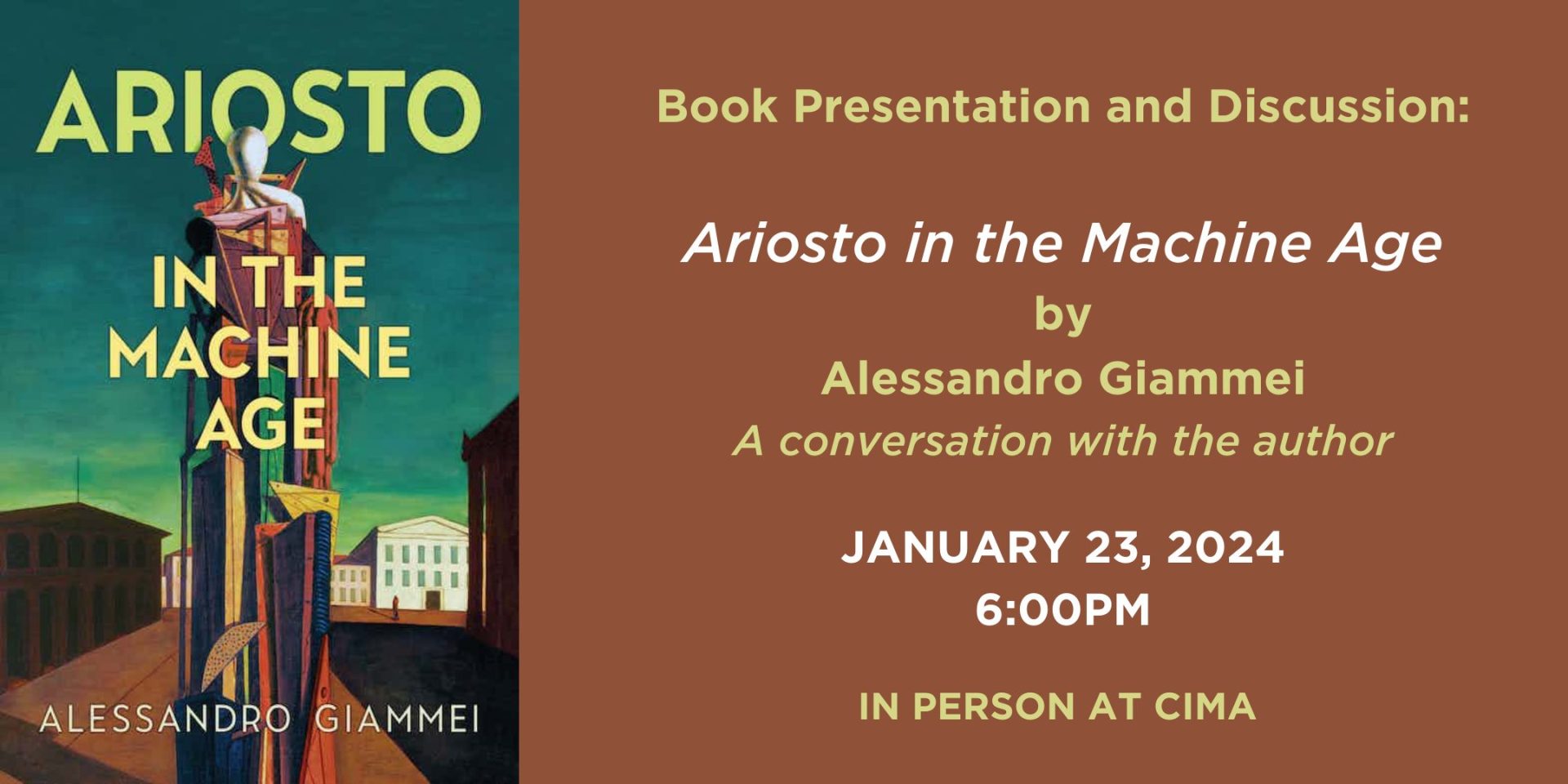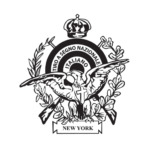Book Presentation and Discussion: Alessandro Giammei, “Ariosto in the Machine Age”
January 23, 2024, 6:00 PM

General Admission: FREE
Join us for a book presentation and panel discussion with author Alessandro Giammei (Yale University), Michele Matteini (New York University) and Emanuele Lugli (Stanford University), moderated by CIMA Fellow Filippo Bosco.
Ariosto in the Machine Age (University of Toronto Press, 2024) reveals how the most influential poet of the Renaissance was conjured or appropriated to shape Magical Realism, avant-garde painting, Fascist cultural propaganda, and cinema in modern Italy between the birth of Futurism and the end of the Second World War.
Based on substantial archival findings, bold iconographic hypotheses, and novel interpretations of literary texts, the book proposes a new account of Italy’s twentieth-century culture through a unique take on Ludovico Ariosto’s early modern poetics and legacy. Starting from the unexpected passéism of Futurists visiting Ferrara on the eve of the First World War, it rereads the development of Giorgio de Chirico’s Metaphysical art and Massimo Bontempelli’s Realismo Magico. The book reconstructs the multimedia archive of the Fascist initiatives for the 1933 centennial anniversary of Ariosto’s death, and then focuses on the passage between Fascist cinema and the birth of neorealism, unearthing unfinished adaptations of the Orlando Furioso by Luchino Visconti and Alessandro Blasetti. Questioning the very concept of reception, this radically interdisciplinary book warns twenty-first-century readers about the risks of monumentalizing the “great authors” of the past.
Alessandro Giammei is Assistant Professor in the Department of Italian Studies at Yale University. He specializes in modern and contemporary literature and art, questioning their fantasies of genealogical roots in early modern and classical cultures. Trained as a philologist and a literary historian in Italy, he moved to the US to hybridize his research and pedagogy with Queer theory, speculative realism, trans-historical and trans-national perspectives.
Alessandro’s first monograph, Nell’officina del nonsense di Toti Scialoja (edizioni del verri 2014), won the Harvard Edition of the Edinburgh Gadda Prize in 2015. He co-wrote Heretical Aesthetics: Pasolini on Painting (Verso, 2023, with Ara H. Merjian) and Giulia Niccolai (Quodlibet, 2022, with Marco Belpoliti and Nunzia Palmieri). He translated Arthur Conan Doyle’s treatise on spirit photography (Fotografare gli spiriti, Marsilio, 2022) and the letters between Virginia Woolf and Lytton Strachey (Ti basta l’Atlantico?, nottetempo, 2021, with Chiara Valerio). He authored Una serie ininterrotta di gesti riusciti (Marsilio, 2018), a book of auto-theory and critical fabulation on Fitzgerald and Central New Jersey. His popular essay on gender and objects, Cose da maschi (Einaudi, 2023), was shortlisted for the Bridge Literary Award.
Alessandro is currently working on two short monographs: one about Shakespeare’s ghost in the philology and spiritism of fascist Italy, commissioned by the series Cambridge Elements in Shakespeare and Text, and Il rinascimento è uno zombie, forthcoming with Einaudi. Besides numerous scientific journals and volumes, his essays and translations appeared in The Paris Review, Vanity Fair, Nuovi Argomenti, and Flash Art. He regularly writes for national newspapers in Italy, such as Domani and il manifesto.
Emanuele Lugli (Stanford University) specializes in Renaissance Italian art and architecture. As a specialist in the history of measurements, he has published a trilogy on the subject (the latest installment being Measuring in the Renaissance: An Introduction, published by Cambridge University Press). In his most recent book, Knots, or the Violence of Desire in Renaissance Florence (Chicago University Press, 2023), Lugli explores the metamorphosis of hair into a repository of moral and erotic ideals during the time of Sandro Botticelli.
Michele Matteini is Associate Professor at the Department of Art History, New York University, and Associate Faculty at the Institute of Fine Arts. He specializes in Chinese painting of the 18th and 19th centuries with special interests in the relationship between painting and antiquarian studies, the material culture of Buddhism, and inter-Asian cultural exchanges. His book, A Ghost in the City: Luo Ping and the Craft of Painting in Eighteenth-Century China was published in June this year.
Light refreshments will be provided
Public programming at CIMA is made possible with the generous support of Tiro a Segno Foundation.

